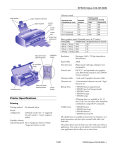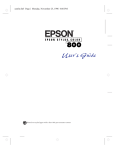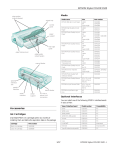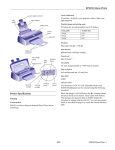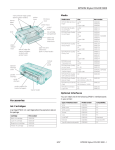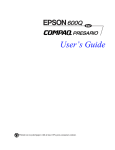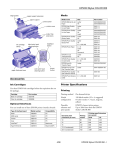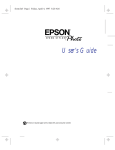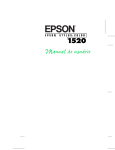Download Epson Stylus 800 - Ink Jet Printer Specifications
Transcript
EPSON Stylus COLOR 800 Character mode edge guides paper support Character pitch (characters per inch) Printable columns Draft Normal (LQ) 10 80 533 400 printer cover 12 96 640 480 15 120 800 600 output tray 17 (10 condensed) 137 912 684 20 (12 condensed) 160 1067 800 control panel output tray extensions black print head cleaning button Raster graphics mode (Printable area is 8.27 inches) load/eject button ink cartridge clamp color print head cleaning button thickness lever power button Print quality Available dots CR speed (inches per second) 180 dpi × 180 dpi 1488 26.7 360 dpi × 360 dpi 2976 20 720 dpi × 720 dpi 5952 20 1440 dpi × 720 dpi 5952 10 Resolution Maximum 1440 × 720 dpi (using driver MicroWeave) Input buffer 32KB Print direction Bidirectional with logic seeking for text and graphics Control code ESC/P 2™ and expanded raster graphics code; IBM X24E emulation code; EPSON remote command Character tables 1 italic and 10 graphics character tables Character sets 14 international character sets and 1 legal character set Bitmap fonts • EPSON Roman (proportional) • EPSON Sans Serif (proportional) • EPSON Courier • EPSON Prestige • EPSON Script Printer Specifications All bitmap fonts are available in 10, 12, and 15 cpi. You can select other font/ pitch combinations using ESC/P commands. Printing Printing method Nozzle configuration Printing speed (characters per second) paper support extension On-demand ink jet Scalable fonts 128 black nozzles (32 × 4, staggered) 64 color nozzles × 3 (cyan, magenta, yellow) • EPSON Roman • EPSON Sans Serif • EPSON Roman T • EPSON Sans Serif H All scalable fonts are available in sizes from 8 to 32 points, in 2 point increments, and four styles: normal, bold, italic, and bold italic. Printable columns and printing speed Up to 8 pages per minute in black, 7 pages per minute in color 1/97 EPSON Stylus COLOR 800 - 1 EPSON Stylus COLOR 800 The printer always uses the fonts you select with your software application. You need to use the printer’s internal fonts only if your application doesn’t allow you to select fonts. Paper Paper Type Size Paper Types Thickness Weight Single Sheets Letter (8.5 × 11 inches) A4 (210 × 297 mm) A5 (148 × 210 mm) B5 (182 × 257 mm) Legal (8.5 × 14 inches) Half letter (5.5 × 8.5 inches) Executive (7.5 × 10 inches) Plain paper and special ink jet papers distributed by EPSON 0.003 to 0.004 inch (0.08 to 0.11 mm) 17 to 24 lb (64 to 90 g/m2); use 24 lb (90 g/m2) paper under normal temperature and humidity conditions Transparencies and glossy media Letter (8.5 × 11 inches) A4 (210 × 297 mm) A6 (105 × 148 mm, glossy film only) Transparencies, glossy paper, and glossy film distributed by EPSON Glossy film and transparencies: 0.0051 to 0.0059 inch (0.13 to 0.15 mm) glossy paper: 0.0067 to 0.0071 inch (0.17 to 0.18 mm) — Self adhesive sheets A4 (210 × 297 mm) Self adhesive sheets distributed by EPSON — — Envelopes No. 10 (9.5 × 4.1 inches, 240 × 104 mm) DL (8.7 × 4.3 inches, 220 × 110 mm) C6 (4.4 × 6.4 inches, 114 × 162 mm) Plain, bond, or air mail paper 0.006 to 0.017 inch (0.16 to 0.43 mm) 12 to 20 lb (45 to 75 g/m2) Cards A6 (105 × 148 mm) 5 × 8 inches (127 × 203 mm) 8 × 10 inches (203 × 254 mm) Ink jet cards distributed by EPSON 0.0091 inch (0.23 mm) 50.7 lb (188 g/m 2) Notes: Since the quality of any particular brand or type of paper may be changed by the manufacturer at any time, EPSON cannot guarantee the use of any particular brand or type of paper. Always test samples of paper stock before purchasing large quantities or printing large jobs. Poor quality paper may reduce print quality and cause paper jams and other problems. If you encounter problems, switch to a higher grade of paper. Do not load curled or folded paper, envelopes, or transparencies. Print on ink jet papers and envelopes only under these conditions: Temperature: 59 to 77°F (15 to 25°C) Humidity: 40 to 60% RH Store glossy media and self adhesive sheets under these conditions: Temperature: 59 to 86°F (15 to 30°C) Humidity: 20 to 60% RH 2 - EPSON Stylus COLOR 800 1/97 EPSON Stylus COLOR 800 Printable area A A B-L B-R B-L B-R C C Envelope Single sheet A The minimum top margin is 0.12 inch (3.0 mm). When printing multiple sheets of glossy media, the minimum top margin is 1.2 inches (30 mm). BL The minimum left margin is 0.12 inch (3.0 mm). BR The minimum right margin is: 0.35 inch (9.0 mm) for Letter and Legal 0.12 inch (3.0 mm) for all other paper sizes 1.10 inches (28 mm) for #10 envelopes 0.28 inch (7 mm) for DL envelopes 0.12 inch (3 mm) for C6 envelopes C The minimum bottom margin is 0.54 inch (14.0 mm). Note: Always load paper into the sheet feeder short edge first except envelopes. Load envelopes long edge first. Ink Cartridges Specification Black ink cartridge (S020108) Color ink cartridge (S020089) Color(s) Black Cyan, magenta, and yellow Print Capacity* 900 pages (A4 paper; text at Normal - 360 dpi; 5%) (ISO/IEC 10561 Letter Pattern) 300 pages (A4 paper; Normal - 360 dpi, 5% each color) Cartridge life 2 years from production date and up to within 6 months after opening package at 25 °F (77 °C) Storage Temperature –4 to 104 °F (–20 to 40 °C)1 month at 104 °F (40 °C) Transit Temperature –30 to 60 °F (–22 to 140 °C) 1 month at 104 °F (40 °C) 120 hours at 140 °F (60 °C) Freezing Temperature** –3.2 °F (16 °C) –0.4 °F (–18 °C) Dimensions 1.09 (W) × 2.1 (D) × 1.5 (H) inches 27.8 (W) × 52.7 (D) × 38.5 (H) mm 1.7 (W) × 2.1(D) × 1.5 (H) inches 42.9 (W) × 52.7 (D) × 38.5 (H) mm * The print capacity may vary depending on how often you use the print head cleaning function. Also, if you print large graphics and dense text with little white space, you use ink faster. ** The ink thaws and is usable after approximately 3 hours at 77 °F (25 °C). Caution: To ensure good results, use genuine EPSON cartridges and do not refill them. Other products may cause damage to your printer not covered by EPSON’s warranty. Do not use an ink cartridge after the expiration date on the package. 1/97 EPSON Stylus COLOR 800 - 3 EPSON Stylus COLOR 800 Mechanical Paper feed method entry Sheet feeder capacity Dimensions Safety Approvals Safety standards UL 1950 with D3, CSA 22.2 950 with D3 EMC FCC part 15 subpart B class B CSA C108.8 class B Friction with auto sheet feeder, rear Maximum 100 sheets of 17 lb (64 g/m2) paper DOS Support Storage Width: 18.7 inches (475 mm) Depth: 10.7 inches (274 mm) Height: 7.4 inches (177 mm) If driver support for the EPSON Stylus COLOR 800 is not available from your software manufacturer, you can use one of the other EPSON ESC/P 2 printer drivers. Choose the first printer available from the following two lists: Black printing only Printing Width: 18.7 inches (475 mm) Depth: 24.0 inches (610 mm) 27.2 inches (692 mm, when loading transparencies) Height: 12.4 inches (315 mm) 7.95 inches (202 mm, when loading transparencies) Weight • LQ-870/1170 • LQ-570(+)/1070(+) • SQ-870/1070 • LQ-850 • LQ-500 Color and black printing • EPSON Stylus PRO • EPSON Stylus COLOR 500 • EPSON Stylus COLOR II • LQ-860 • LQ-2550 14.3 lb (6.5 kg) without the ink cartridges Electrical Specification 120 V model 240 V model Input voltage range 103.5 to 132 V 198 to 264 V Rated frequency range 50 to 60 Hz Input frequency range 49.5 to 60.5 Hz Rated current 0.4A Power consumption Approx. 18 W (ISO/IEC 10561 Letter Pattern) Control Panel 0.2A paper out light Environmental Temperature Humidity black cleaning button Operation 50 to 95 °F (10 to 35 °C) Storage* –4 to 140 °F (–20 to 60 °C) 1 month at 104 °F (40 °C) 120 hours at 140 °F (60 °C) load/eject button color cleaning button Operation 20 to 80% RH Storage* 5 to 85% RH (without condensation) power button power light * Stored in shipping container 4 - EPSON Stylus COLOR 800 black ink out light color ink out light 1/97 EPSON Stylus COLOR 800 The four lights on your printer’s control panel show the printer’s status and alert you to problems like paper jams. S S BA BA P PSBA PSBA Using Hex Dump Mode You can use the printer’s hex dump mode to identify problems if you know how to interpret hex code. Or, you can fax the hex printout to a technical support representative. Follow these steps to use hex dump mode: When the paper light flashes, paper is jammed in the printer. Turn off the printer and gently pull out all jammed paper. Then press the load/eject button. E 1. Make sure the printer is turned off and has paper in the feeder. When the paper light comes on, your paper ran out or is incorrectly loaded. Load paper in the feeder and then press the load/eject button. 2. Open the cover. E E P X 3. Hold down the load/eject button and the color cleaning button and press the power button. The printer prints Hex Dump Mode at the top of a page and then stops. When an ink light flashes, your ink supply is low. Make sure you have a replacement cartridge. 4. Print one or more pages from an application as usual. The printer prints the exact code it receives in hexadecimal format. When an ink light comes on, you need to replace the ink cartridge. When the power light flashes, the printer is receiving a print job or performing a maintenance operation. Default Control Panel Settings You can change the following “default” settings from the printer’s control panel: When the power and paper lights flash and the other lights are on, your printer has a carriage error. When all the lights flash, your printer may have an internal error. Testing the Printer You can run a self test to determine whether the problem comes from the printer itself or the computer. ❏ If the results are satisfactory, the problem lies in software settings, the interface cable, or your computer. Setting Options Print direction Auto, Bi-D, Uni-D Font Courier, Roman, Sans Serif, Prestige, Script, Roman T, Sans Serif H, Draft Pitch 10 cpi, 12 cpi, 15 cpi, 17.1 cpi, 20 cpi, Proportional I/F mode Auto, Parallel, Serial, Option Auto I/F wait time 10 seconds, 30 seconds Software ESC/P 2, IBM X24E Auto CR (IBM mode only) Off, On AGM (IBM mode only) Off, On Character table PC437, PC850, PC860, PC861, PC863, PC865, Abicomp, BRASCII, Roman 8, ISO Latin 1, Italic U.S.A., Italic France, Italic Germany, Italic U.K., Italic Denmark 1, Italic Sweden, Italic Italy, Italic Spain 1 Auto line feed Off, On ❏ If the self test does not print correctly, you have a problem with your printer. Follow these steps to run the test: 1. Make sure both the printer and computer are turned off. Network I/F mode Off, On 2. Disconnect the interface cable from the printer. Loading position 8.5 mm, 3 mm, Others 3. Make sure paper is loaded in the feeder. Economy Off, On Parallel I/F transfer rate Fast, Normal E P P 4. Press the load/eject button and hold it down while you press the power button. Continue to hold the buttons until the power light starts to flash. Changing control panel settings Follow these steps to change the settings listed above: The printer prints a nozzle check pattern and samples of fonts and colors. 5. To end the test, turn off the printer. 1/97 1. Make sure the printer is turned off and has paper loaded. 2. Hold down the color cleaning button and press the power button. The printer prints a summary of instructions for changing settings and choosing the language to use for additional instructions. X EPSON Stylus COLOR 800 - 5 EPSON Stylus COLOR 800 X 3. Press the color cleaning button to print a list of current settings and additional instructions. 4. After you make the changes you want, turn the printer off to save the settings. The settings remain in effect until you change them again. 3. Click the Main tab if necessary and make sure the Mode option is set to Automatic. This is the easiest way to get good printing results for all kinds of documents, on all types of paper. 4. Choose the Media Type you want to print on. The type of paper or other media you choose determines the print quality or resolution you can use. See page 14 for guidelines on choosing paper. Printing from Windows When you want to print from your Windows application, you click the print icon or choose Print from the File menu. You can then choose which pages to print, the number of copies, and other options. The settings that describe your print job—whether you want to use color or black ink, for example—are part of your printer driver software. Note: For printing at the highest resolution (SuperFine quality at 1440 dpi), you need to use one of the photo quality media. For the best printing at any resolution, always use EPSON media. 5. Choose Color or Black ink. 6. Set the slider to Quality or Speed. This lets you choose between the fastest printing or the highest resolution for the media you’re using. (The slider is not available for certain media types.) Note: If you’re using Windows NT, you’ll need special software for your printer. Contact EPSON if you need printer driver software for Windows NT. 7. If necessary, click the Paper tab and choose your paper size, number of copies, and orientation. If your software application lets you control these settings, you don’t need to use the Paper tab. Setting Printer Options from Windows Applications Follow these steps to check printer settings from your word processor or other Windows software: 8. Click OK when you’re finished checking your settings. The dialog box closes. 1. Click the Print icon or choose Print or Print Setup from the File menu. You see a printing dialog box. If you’re using Windows 95, you can click Apply and keep the dialog box open. 2. Make sure your EPSON Stylus COLOR 800 printer is selected, and then click the Printer, Setup, Properties, or Options button. (You may have to click a combination of these buttons.) You see a dialog box like the following: 9. In the printing dialog box, click Close, OK, or Print. You may need to click a combination of these buttons. Setting Windows Default Options When you change printer settings through your software application, the settings apply only to the application you’re using. If you want to adjust the default settings for all your Windows applications, you can access the dialog box through the Windows 95 Settings option or the Windows 3.1 Control Panel. Click to see list of media types. Make sure all your software applications are closed before you start. If not, you’ll have to close and then reopen them to have the new default settings take effect. Setting Default Options in Windows 95 Click for more information. Follow these steps: 1. Click Start, point to Settings, and then point to Printers. 2. Right-click the EPSON Stylus COLOR 800 icon. 3. Select Properties. Then click the Main tab. You see the Main printer settings dialog box. Any changes you make will become the default settings for all your applications and documents. 6 - EPSON Stylus COLOR 800 1/97 EPSON Stylus COLOR 800 6. Choose the Media Type you want to print on. See page 14 for guidelines on choosing paper. Setting Default Options in Windows 3.1 Follow these steps: Note: For printing at the highest resolution (SuperFine quality at 1440 dpi), you need to use one of the photo quality media. 1. Double-click the Control Panel icon in the Main group. 2. Double-click the Printers icon. 3. Select EPSON Stylus COLOR 800 from the list of printers and click Setup. 7. Choose Color or Black ink. You see the Main printer settings dialog box. Any changes you make will become the default settings for all your applications and documents. 8. Set the slider to Quality or Speed. This lets you choose between the fastest printing or the highest resolution for the media you’re using. 9. Click Print when you’re finished checking your settings. Printing from a Macintosh If you chose background printing when you set up your printer, you can continue working while your document is printing. When you set up a new printer for your Macintosh, you need to check the page setup for documents in each application you use. You can then click the print icon or choose Print from the File menu. You see a dialog box that lets you choose which pages to print, the number of copies, and other options. The settings that describe your print job—whether you want to use color or black ink, for example—are part of your printer driver software. Note: On the Macintosh, printer settings are saved with your document, but you can’t save them from one application to another. You’ll have to check your settings each time you open a new application. If you want to reuse settings, you can create document templates for your favorite applications. Follow these steps to check printer settings from your word processor or other Macintosh software: Managing Print Jobs in Windows 1. Choose Page Setup from the File menu. You see the Page Setup dialog box. Your Windows printer software includes two management utilities: the Spool Manager and Status Monitor. 2. Choose your paper size and other page setup options and click OK. ❏ The Spool Manager starts automatically when you send a job to the printer. It allows you to print in the background while you continue to work on your computer and to queue jobs to print at a later time. If you’re using your printer on a network, it also handles multiple print jobs that come in at the same time. 3. Choose Print from the File menu or click the Print icon in your application. You see a dialog box like the following: Click for more information about printer settings. ❏ The Status Monitor, which is available only if you’re using Windows 95, also starts automatically when you send a job to the printer. It displays in the lower right corner of your screen to alert you about printer and ink status, as described on page 9. Note: The Status Monitor doesn’t work if you’re printing over a network. Click to see list of media types. Using the Spool Manager 4. Choose the number of copies and indicate which pages you want to print. The Spool Manager works like the Windows Print Manager. 5. Make sure the Mode option is set to Automatic. This is the easiest way to get good printing results for all kinds of documents, on all types of paper. ❏ To open it while you’re printing, click the Spool Manager icon that appears on the Taskbar (Windows 95) or at the bottom of your desktop (Windows 3.1). 1/97 EPSON Stylus COLOR 800 - 7 EPSON Stylus COLOR 800 ❏ To open the Spool Manager at any time, double-click the Spool Manager4 icon in the EPSON program group or folder. Deleting a Stalled Print Job If you’re having trouble printing, it may be because of a stalled print job. Follow these steps to delete it so you can continue printing: You see the Spool Manager window: 1. Open the Spool Manager as described above. menus 2. Click on any print jobs marked Held, then open the Document menu and click Delete. 3. Exit Spool Manager and try printing again. Changing the Default Spool Directory If you get an error message when you try to print, or printing is very slow, you can try changing your default spool directory. Follow these steps: queue 1. Make a directory on your hard drive where you want Spool Manager to store journal files, for example, C:\SPLTEMP. journal file 2. Open the Spool Manager as described above. When you send a job to your printer, your printer software creates a temporary journal file, stores it in the C:\TEMP or C:\WINDOWS\TEMP folder or directory, and assigns it to a print queue. The software then sends the file to your printer at the right time. 3. Make sure EPSON Stylus COLOR 800 is selected, and then choose Setup from the Queue menu. The Queue Setup dialog box appears. The Spool Manager window displays the status of your print queues and journal files and lets you control them. Here are some of the things you can do: 4. Change the spool directory to the one you created in step 1. Also make sure Use Print Manager for this port is checked. (If you don’t see the Status Monitor when you print, make sure it’s unchecked.) Then click OK. ❏ Hold or release a queue 5. Choose Default Spool Directory from the Options menu. ❏ Send journal files to your printer over a network 6. In the dialog box, change the spool directory to the one you created in step 1. Then click OK. ❏ Hold, re-queue, or delete a journal file 7. Close Spool Manager. ❏ Select the information you want to see in the Spool Manager window Using the Status Monitor ❏ Prevent the Despooler popup window from appearing on your screen whenever you print The Status Monitor, available only if you’re using Windows 95, displays automatically when you send a job to the printer. However, you can use it at any time to see how much ink you have left. Follow these steps: ❏ Change your default spool directory 1. Access the Main printer settings dialog box as described on page 6. 2. Click the Utility tab. 3. Click the Status Monitor icon. You see the Despooler window with the Status Monitor at the bottom. 4. Check the amount of ink you have left. For more information about the Despooler window, see the next section. If the Status Monitor doesn’t appear on the Despooler window, you may need to check your bidirectional spool settings. Follow these steps: 1. Click Start, point to Settings, and then point to Printers. 8 - EPSON Stylus COLOR 800 1/97 EPSON Stylus COLOR 800 2. Right-click the EPSON Stylus COLOR 800 icon. The Status Monitor at the bottom of the dialog box shows how much ink is left in your printer, along with these status icons: 3. Select Properties. Then click the Details tab. 4. Click Spool Settings. The Status Monitor is checking printer status. 5. Make sure Enable bi-directional support for this printer is turned on. Then click OK. An error has occured. Check your printer. Using the Despooler While your document is printing, the EPSON Despooler dialog box appears in the lower right corner of your screen: Your printer is ready to print. Your printer is printing. Click to pause printing. Click to cancel printing. B A The ink level is low or empty. Check the or light on the control panel and replace the cartridge if necessary. The name of the file you’re printing appears here. Click to restart printing. Managing Print Jobs on a Macintosh Your Macintosh printer software includes two management utilities: Monitor2 and Status Monitor. ❏ If you’re using background printing, Monitor2 starts automatically when you send a job to the printer. It handles background printing while you continue to work on your Macintosh and lets you track documents that are waiting to be printed. This dialog box shows the progress of your print job and the status of your printer. If you run out of paper while printing, for example, the Despooler warns you. You can use the buttons to cancel, pause, or restart your print job. ❏ The Status Monitor alerts you to any problems that occur during printing. You can also use it at any time to see how much ink you have left. Note: The Status Monitor appears only if you’re using Windows 95 and you’re not printing over a network. Using Monitor2 The Monitor2 utility lets you continue to work on your Macintosh while your document is printing. However, background printing is slower and may also slow down your system. If you want to use this utility, you need to turn on background printing in the Chooser and increase the memory allocation for Monitor2. Follow these steps to turn on background printing and use the Monitor2 utility: 1. Open the Chooser from the Apple menu and make sure your EPSON Stylus COLOR 800 printer is selected. 2. Under Background Printing, click On and close the Chooser. 3. Select EPSON Monitor2 in your Extensions folder within the System folder. 4. Choose Get Info from the File menu. 1/97 EPSON Stylus COLOR 800 - 9 EPSON Stylus COLOR 800 5. Set the Memory Requirements to 2000 or 3000, depending on your system’s available RAM. 4. If you want to change printer messages and warnings, click the Configuration button. You see the following dialog box: 6. While you’re printing, click the EPSON Monitor2 icon on the Application menu at the right end of the menu bar. You see a dialog box like the following: Printing stops when these messages appear. Job currently printing Printing continues when these messages appear. Jobs queued for printing 5. Choose the options you want and click OK. Network Printing on a PC 7. You can select a job and cancel it or just use this window to track the printer’s progress. You can use your printer on a network under Windows 95 or other network operating systems. First you need to set up your printer, using either your printer software’s built-in network support or the network’s LPT port redirection functions. Using the Macintosh Status Monitor You can use the Status Monitor to check the level of ink in your printer and to control the way your software warns you about printer problems. Follow these steps: Note: If you need to install a network interface board in your printer, see page 17 for instructions. 1. Choose Print from the File menu or click the Print button in your application. You see the printer settings dialog box. 2. Click the Utility button. When you use your printer’s built-in support, the Spool Manager sends journal files from your computer to a shared directory on a network server. These files can then be printed from another computer attached to the printer. 3. Click the StatusMonitor icon. The software checks the amount of ink remaining in the printer and displays the StatusMonitor window: First you need to run Spool Manager and identify the shared directory to use for journal files. After you set this up on the computer connected to the printer (the host system), you need to perform a similar procedure on each remote system on the network. Under Windows 95, you also need to specify the port and network path to the printer. Setting Up the Host System Follow these steps to set up the computer connected to the printer: Click to control messages and warnings. 1. Create an icon for the EPSON Spool Manager (EPSPLMGR.EXE in the \WINDOWS\SYSTEM folder or directory). Click to recheck ink level. 2. Place this icon in the Startup folder. 3. Open the Spool Manager window as described on page 7. 10 - EPSON Stylus COLOR 800 1/97 EPSON Stylus COLOR 800 4. In the Spool Manager window, double-click the queue you want to use for network printing. The Queue Setup dialog box appears. Network Printing on a Macintosh If you want to use your printer on an AppleTalk ™ network, you need to install one of the optional interface boards: either the LocalTalk™ board or the Ethernet™ board. See page 17 for more information about optional interfaces. 5. Click the Remote Despool tab and then click the Printing from remote queues option. 6. Click the Browse button and select the remote server directory that will receive journal files. Then you can use the EPSON Namer utility and set up your printer in the Chooser. The EPSON Namer was installed on your hard drive along with the other printer software. 7. Click OK and minimize the Spool Manager. Setting Up Remote Systems Assigning a Name to the Printer Follow these steps to set up computers on the network: Follow these steps to use the EPSON Namer utility: 1. Create an icon for the EPSON Spool Manager (EPSPLMGR.EXE in the \WINDOWS\SYSTEM folder or directory). 1. Double-click the EPSON Namer icon on your hard drive. 2. Click the EPSON Stylus(AT) icon in the Device Types window. 2. Open the Spool Manager window as described on page 7. 3. Select the zone where your printer is located. 3. In the Spool Manager window, double-click the queue you want to use for network printing. The Queue Setup dialog box appears. 4. Under New Name, type a name for your printer to distinguish it from other printers on the network. 4. Click the Spool to remote printer button. 5. Click Rename and then click Done. 5. Click the Browse button and select the directory you’re using for journal files on the host system. Using the AppleTalk Connection Make sure your printer is turned on and then follow these steps to set up your printer on an AppleTalk network: 6. Click OK and minimize the Spool Manager. Setting Up Your Network Path in Windows 95 1. Open the Chooser from the Apple menu. If you want to use your printer on a network running Windows 95, you need to set up the port and network path on the computer connected to the printer. Follow these steps: 2. Click the EPSON Stylus(AT) icon. 3. Select the AppleTalk zone you want to use. A list of all printers connected to the selected zone appears on the right. 1. Double-click My Computer. 4. Click the name you assigned to your EPSON Stylus COLOR 800. You see a prompt asking you to confirm your choice. 2. Double-click the Printers folder. 3. Right-click the EPSON Stylus COLOR 800 icon and choose Properties. 5. Click OK. 4. Click the Details tab. If your printer name doesn’t appear, make sure the printer is turned on and correctly connected, then click RETRY. 5. Click the Add Port button, then specify the network path to the printer and click OK. 6. To ensure compatibility, leave Background Printing turned off. 6. Open the Spool Manager window as described on page 7. 7. Close the Chooser when you’re finished. 7. In the Spool Manager window, double-click your printer’s queue. The Queue Setup dialog box appears. 8. Make sure the Use Print Manager for this port option is checked. Then click OK. 1/97 EPSON Stylus COLOR 800 - 11 EPSON Stylus COLOR 800 Y 3. Press the black or three seconds. Replacing an Ink Cartridge B A Caution: If you press the cleaning button when no ink out light is flashing or on, the printer cleans the print heads, as described on page 16. If you need to replace an ink cartridge before the lights flash (because the ink is too old, for example) follow the instructions on page 13. When a black or color ink out light flashes, the indicated cartridge is low on ink. This is a good time to make sure you have a new cartridge. When the light stays on, the cartridge is empty and you need to replace it. P Caution: To ensure good results, use genuine EPSON cartridges and do not refill them. Other products may cause damage to your printer not covered by EPSON’s warranty. The print heads move slightly left and the power light begins flashing. (The print heads return to their home position if you don’t proceed to step 4 within 60 seconds.) Use these EPSON ink cartridges within six months of installing them and before the expiration date on the package: 4. Pull up the ink cartridge clamp. (Although the illustration shows the black ink cartridge, the procedure is the same for replacing the color ink cartridge.) ❏ Black ink cartridge S020108 ❏ Color ink cartridge A Caution: Don’t open the clamp or remove a cartridge except to replace it with a new one. Once you remove a cartridge, you can’t reuse it, even if it contains ink. S020089 color ink out light comes on, you can continue When the to print with black ink. Simply turn the printer off and then back on again. When you print, make sure you choose Black as the Ink setting in your printer software. Removing an Empty Ink Cartridge B X color cleaning button and hold it for A color You can replace a cartridge when the black or ink out light is either flashing or on. Make sure the printer is turned on and not printing before you start. Then follow these steps: Caution: To avoid damaging the printer, never move the print heads by hand. 1. Determine which cartridge needs to be replaced. Y X 2. Lower the output tray and raise the printer cover. Then locate the black and color cleaning buttons next to the control panel under the printer’s cover. The cartridge rises up from its holder. 5. Lift the cartridge out of the printer and dispose of it carefully. Warning: If ink gets on your hands, wash them thoroughly with soap and water. If ink gets into your eyes, flush them immediately with water. black cleaning button 6. Follow the steps in the next section to install the new ink cartridge. color cleaning button 12 - EPSON Stylus COLOR 800 1/97 EPSON Stylus COLOR 800 P Installing the New Cartridge Caution: power light is Don’t turn off the printer while the flashing, unless the printer has not moved or made noise for more than 5 minutes. Once you have removed the empty cartridge, you’re ready to install the new one. Follow these steps: 1. Remove the new ink cartridge from its packaging. Replacing an Outdated Ink Cartridge 2. Remove the yellow tape seal as shown: If an ink cartridge is more than six months old, you may need to replace it. How can you tell? You may notice that your printouts don’t look as good as they used to. If print quality doesn’t improve after cleaning and aligning the print heads, you can replace one or both cartridges. A Follow these steps to replace an ink cartridge before the color ink out light is flashing or on: black or B 1. Make sure the printer is turned on and not printing. black cartridge Y X 2. Lower the output tray and raise the printer cover. Then locate the black and color cleaning buttons next to the control panel under the printer’s cover. color cartridge Caution: You must remove the yellow tape seal from the top of the cartridge; leaving the tape on will permanently damage it. Do not remove the clear seal from the bottom of the cartridge; ink will leak out. Y X 3. Press both the black and color cleaning buttons and hold them down for a few seconds until the print heads move to the left. 3. Lower the ink cartridge into its holder with the label facing up and the arrow pointing to the back of the printer. Caution: To avoid damaging the printer, never move the print heads by hand. ❏ To replace the black ink cartridge, follow the instructions beginning with step 4 on page 12. X ❏ To replace the color ink cartridge, press the color cleaning button and hold it down for a few seconds. After the color ink cartridge moves to the left, follow the instructions beginning with step 4 on page 12. Loading Paper 1. Slide the left edge guide all the way left and pull out the output tray extensions. 4. Press down the ink cartridge clamp until it locks in place. 5. If you need to replace the other ink cartridge, follow the steps under “Removing an Empty Ink Cartridge,” and then steps 1 through 4 under “Installing the New Cartridge.” 6. Press the E load/eject button and close the printer cover. The printer moves the print heads and begins charging the ink delivery system. (Even if you don’t press the button, ink charging begins 60 seconds after you close the clamp.) P The power light flashes, and the printer makes various sounds. Charging takes about two minutes. When it’s finished, you can print again. 1/97 EPSON Stylus COLOR 800 - 13 EPSON Stylus COLOR 800 2. Fan a stack of plain paper and then even the edges. EPSON ink jet media and their settings 3. Load the stack with the printable surface face up. Push the paper against the right edge guide. arrow mark 4. Slide the left edge guide back against the stack of paper. EPSON 360 dpi Ink Jet Paper A4 Letter S041059 S041060 360 dpi Ink Jet Paper EPSON Special Coated Paper for 360 dpi Printing Letter S041060 EPSON High Quality Ink Jet Paper Letter S041111 EPSON Photo Quality Ink Jet Paper A4 Letter Legal S041061 S041062 S041067 EPSON Photo Quality Glossy Paper A4 Letter S041126 S041124 14 - EPSON Stylus COLOR 800 EPSON Photo Quality Glossy Film A4 Letter S041071 S041072 Photo Quality Glossy Film EPSON High Quality Glossy Paper Letter S041072 EPSON Iron-On Transfer Paper Letter S041001, S041002 EPSON Ink Jet Transparencies A4 Letter S041063 S041064 EPSON Photo Quality Ink Jet Cards 4.1 × 5.8 (A6) 5×8 8 × 10 S041054 S041121 S041122 EPSON 720 dpi Index Card 4.1 × 5.8 (A6) S041054 EPSON Photo Quality Self Adhesive Sheets A4 S041106 Ink Jet Transparencies Photo Quality Ink Jet Paper Load the top edge first. When you load legal-size paper, pull up the paper support extension as shown below: EPSON ink jet media and their settings Media Type setting Media Type setting Note: When you load paper, make sure the printable side is facing up. Some special media have a cut corner that you need to position correctly; follow any instructions in the package. Always handle sheets by the edges, and don’t touch the printable surface. When you print on special media, you need to be careful about choosing the correct Media Type and Paper Size settings in your printer software. The following table lists the available EPSON media and the Media Type setting to choose for each one. Part number Part number Letterhead, Preprinted Forms, and Legal-size Paper Using Special Media Size Size The type of paper or other media you use is one of the most important factors in determining the quality of your printed output. For example, you can achieve the highest resolution (SuperFine quality at 1440 dpi) only when you use EPSON Photo Quality media. The following tips will help you get the best results on any type of paper or other media. Note: Don’t load paper above the arrow mark inside the left edge guide. Media name Media name Photo Quality Ink Jet Paper Photo Quality Glossy Paper 1/97 EPSON Stylus COLOR 800 EPSON 360 dpi High Quality and Photo Quality Ink Jet Paper Envelopes You can load up to 10 envelopes as shown below: Caution: Don’t use the cleaning sheets that may be included with your special media; they may damage the printer. You can load paper up to the arrow mark on the left edge guide. If you use legal-size ink jet paper, don’t load it more than half way to the arrow mark. EPSON Photo Quality Glossy Paper, Film, and Transparencies Before you load glossy media or transparencies, put a support sheet (packed with the media) or a plain paper sheet beneath the stack. You can load up to 20 sheets of glossy paper, and up to 30 sheets of glossy film or transparencies. Note: Use ink jet papers within one year of purchase. Use glossy media and transparencies within six months. Return unused sheets and envelopes to their original package as soon as possible. If ink smears when you print on envelopes or other thick media, set the paper thickness lever to the + position. Open the printer cover and position the lever as shown below. Then close the cover and print. (Make sure you return the lever to the 0 position before you print on other media.) However, you may get better results by loading one sheet at a time. With multiple sheets loaded, the minimum top margin you can use is 1.2 inches (30 mm). If you want to use a smaller top margin, load and print one sheet at a time. Set the thickness lever to + if ink smears when you print on envelopes or cards. Remove each sheet from the output tray immediately after it’s printed. Make sure each sheet is dry before stacking. To print on transparencies, remove the paper support and reposition it in the slots at the back of the printer as shown: EPSON Photo Quality Ink Jet Cards You can use these cards to print photographs that look almost as good as the ones you get from film processing. Make sure you set the paper thickness lever to the + position as shown above. You can load up to 30 cards at a time. Always place the included support sheet under the cards. When you’re ready to print, use your software to set the Paper Size option for the size card you’re using. EPSON Photo Quality Self Adhesive Sheets Use these sheets to print labels or stickers. You can load one sheet at a time. 1/97 EPSON Stylus COLOR 800 - 15 EPSON Stylus COLOR 800 EPSON Iron-On Transfer Paper 6. Make sure paper is loaded in the printer and click Print nozzle check pattern (Windows) or Confirmation (Macintosh. Note: For iron-on transfers, make sure you reverse your image before you print it, especially if it includes text. Then the text will read correctly when it’s transferred. You can use the Flip Horizontal option in your printer software. If your print quality has not improved, repeat the steps above. Using the Control Panel To Clean the Print Heads You can print photos, company logos, or anything else you want on this paper, and then transfer your images to T-shirts or other cloth items. Load one sheet of transfer paper at a time. After you print, follow the instructions that came with the paper to iron the image onto the shirt or other item. Follow these steps to clean the print heads using the control panel buttons: B 2. Open the printer cover. Y X 3. Press the black or color cleaning button and hold it for three seconds. Cleaning takes about two minutes, during which the printer makes some noise and the power light flashes. Printer Care P Cleaning the Print Heads P 4. When the power light stops flashing, repeat step 2 for the other print head if necessary. If your printed image is unexpectedly light or faint, or dots are missing from the image, you may need to clean the print heads. This unclogs the nozzles so they can deliver ink properly. P After you’re finished cleaning and the power light stops flashing, you need to run a nozzle check. 5. Access the main printer settings dialog box. Cleaning the print heads uses ink, so clean them only if print quality declines. You can clean the print heads in either of the following two ways: 6. Click the Utility tab (Windows) or the Utility button (Macintosh). You see the Utility menu. ❏ With the Head Cleaning utility in your printer software (when the printer is on a local port rather than a network) 7. Click the Nozzle Check icon. See the next section for instructions on examining the nozzle check pattern. ❏ Using the printer’s control panel buttons If your print quality has not improved, repeat the steps above. Using the Head Cleaning Utility Follow these steps to run the utility from a Windows computer or a Macintosh: B A 1. Make sure the printer is turned on and not printing, and color ink out lights are off. that the black and Examining the Nozzle Check Pattern Examine the nozzle check pattern you print after cleaning the print heads. It should look something like this, with the lower pattern colored cyan, magenta, and yellow: A 1. Make sure the printer is turned on but not printing, and the black and color ink out lights are off. 2. Access the main printer settings dialog box. 3. Click the Utility tab (Windows) or the Utility button (Macintosh). You see the Utility menu. 4. Click the Head Cleaning icon. Caution: Don’t turn off the printer while the power light is flashing, unless the printer has not moved or made noise for more than 5 minutes. P Each staggered horizontal and straight vertical line should be complete, with no gaps in the dot pattern. If your printout looks okay, you’re done. If any dots are missing, clean the print heads again, as explained in the previous sections. 5. Follow the instructions on the screen to clean one or both print heads. Cleaning each head takes about two minutes, during which the printer makes some noise and the power light flashes. P When the power light stops flashing, you need to run a nozzle check. 16 - EPSON Stylus COLOR 800 1/97 EPSON Stylus COLOR 800 Aligning the Print Heads Caution: Don’t touch the gears inside the printer. If your printouts contain misaligned vertical lines, you may need to align the print heads. You can align the print heads in either of the following two ways: Never use alcohol or thinner for cleaning; they can damage the printer components and case. ❏ With the Print Head Alignment utility in your printer software (when the printer is on a local port rather than a network) Don’t get water on the printer components. Don’t use a hard or abrasive brush. Don’t spray lubricants or oils inside the printer. ❏ Using the printer’s control panel buttons 1. Turn off the printer, unplug the power cord, and disconnect the printer cable. Using the Print Head Alignment Utility 2. Remove all the paper from the sheet feeder. 3. Carefully clean away dust and dirt with a soft brush. Follow these steps to run the utility from a Windows computer or a Macintosh: 4. Clean the exterior of the printer with a soft, damp cloth. Keep the printer cover closed so water doesn’t get inside. 1. Make sure the printer is turned on and paper is loaded. 5. Clean ink out of the printer’s interior with a soft, damp cloth. Caution: Load paper that’s at least 8.27 inches (210 mm) wide. This prevents ink from spraying inside the printer and smudging your printouts. Using Optional Interfaces 2. Access the Main printer settings dialog box. Your EPSON Stylus COLOR 800 includes both parallel and serial interfaces. You can connect it to a PC or Macintosh, or both at the same time. If you want to connect to another system or to a network, you can install an optional interface board. 3. Click the Utility tab (Windows) or the Utility button (Macintosh). You see the Utility menu. 4. Click the Print Head Alignment icon. 5. Follow the instructions on the screen to print a test page and select the correct alignment. You can install the following interface boards in your printer: Using the Control Panel To Align the Print Heads Follow these steps to align the print heads using the control panel buttons: Type of interface board Model number Compatibility Serial C823051 PC 1. Make sure the printer is turned off and paper is loaded. 32KB serial C832071 PC 32KB parallel C823101 PC LocalTalk C823121 Macintosh Twinax C823151 PC Coax C823141 PC Ethernet C823461 Macintosh/PC 2. Open the printer cover. E Y 3. Hold down the load/eject button and the black cleaning button and turn on the printer. Then release the buttons. The printer prints an instruction sheet that tells you how to align the print heads. Using Macintosh Interface Boards 4. Follow the instructions on the printed sheet. If you are planning to install the LocalTalk board, you will also need two LocalTalk Locking Connector Kits (DIN-8 version). Attach one connector box to the AppleTalk interface on the printer and the other to the printer port on the Macintosh. Then attach the LocalTalk cable between the two connector boxes. For more information, see the instructions that came with the connector kits. 5. When you’re finished, turn off the printer to exit the alignment mode. Cleaning the Printer To keep your printer working at its best, you should clean it several times a year, following these steps: If you install the Ethernet board connected to a thin coaxial (10BASE2) cable, and the printer is the last device on the network, you need to obtain a 50-ohm terminator. The Ethernet transceiver is included on the EPSON Ethernet board, so you do not need an adapter box for the printer. 1/97 EPSON Stylus COLOR 800 - 17 EPSON Stylus COLOR 800 Using the PC Serial Interface Board 5. Slide the interface board along the slots on both sides of the compartment. Push it in firmly to fully insert the board’s connector into the printer’s internal socket. Before you install the serial interface board in your printer, follow the instructions that come with the board for setting baud rate and parity. Refer to your computer documentation for information about matching the board’s settings to your computer system. You may also need to set the board’s handshake timing, error handling, and other data transfer conventions. Installing Optional Interfaces Before you install an optional interface board in your printer, make sure the printer is turned off and all the printer’s lights are off. Then follow these steps: 1. Unplug the power cord from the electrical outlet (and from the back of the printer, if your printer’s power cord is removable). 6. Secure the interface board in the slot with the two screws included with the interface board. Caution: To avoid damaging your printer or computer, do not install the interface board when the printer is connected to an electrical outlet. 7. Connect the proper interface cable to the interface board and to your computer. If the cable has a grounding wire, connect it to one of the screws securing the parallel interface. 2. Turn the printer around so that its back faces you, and disconnect any interface cables. Also, if you are using more than one computer, reconnect the other interface cable. 3. Use a cross-head screwdriver to remove the two screws securing the shield plate to the interface slot; then lift off the plate. Be sure to keep both screws; you may need to use them again when you reinstall the shield plate. 8. Make sure the printer is turned off. Then plug in the power cord. In most cases, the printer automatically detects the interface you’re using. However, if you have trouble printing through an installed interface board, you may need to change the printer’s I/F (interface) mode setting. See page 5 for instructions. To remove the interface board, follow the above steps in reverse order. Information Reference List Engineering Change Notices None 4. Be sure to set any switches and jumpers on the board. See the interface board’s manual for details. If your board has a jumper labeled JG, make sure that you set it to on, or the board will not work properly. Product Support Bulletins None Technical Information Bulletins None 18 - EPSON Stylus COLOR 800 1/97 EPSON Stylus COLOR 800 Related Documentation TM-STYCLR800 EPSON Stylus COLOR 800 Service Manual PL-STYCLR800 EPSON Stylus COLOR 800 Parts Price List 4006678 EPSON Stylus COLOR 800 User’s Guide 4006677 EPSON Stylus COLOR 800 Quick Setup CPD4457 Installing Your Software 1/97 EPSON Stylus COLOR 800 - 19 EPSON Stylus COLOR 800 20 - EPSON Stylus COLOR 800 1/97




















